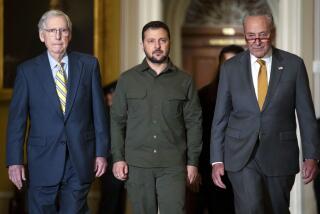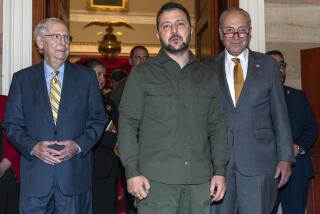Congress Acts to Slash Aid to Afghan Rebels : Secret wars: Budget cuts are on the verge of hobbling all three covert U.S. military operations.
WASHINGTON — Reflecting the thaw in the Cold War, Congress is on the verge of hobbling all three ongoing covert U.S. military operations, including cutting about $50 million from the Bush Administration’s $300-million request for rebels in Afghanistan, sources said Tuesday.
The actions, believed to be the first substantial curtailment of the secret U.S. proxy wars in more than a decade, signal growing congressional impatience with the operations. Advocates of the measures maintain that they will speed the peace process, but the Administration opposes them as “counterproductive.”
A House-Senate conference committee, meeting to reconcile different versions of the 1991 intelligence appropriations bill, agreed on the reduced funding level for the Afghan rebels. It also accepted Senate efforts to phase out covert aid to Cambodia early next year and accepted much of the House-approved language under which aid to Angolan rebels will be closely tied to peace moves in that nation.
Funds for the three covert activities are contained in a secret annex to the conference committee report filed Tuesday evening, congressional officials said. The unclassified part of the report will be published today, when Congress takes up the full measure, along with a statement on the conferees’ conclusions on Angola and perhaps Cambodia, the officials said.
The conferees also agreed on new regulations to govern covert action, regulations that grew out of the Iran-Contra scandal. The Reagan Administration put many of the new rules into effect two years ago through an executive order, but the bill would give these measures the force of law and attempt to circumscribe the President’s ability to authorize such actions.
In particular, the new guidelines are said to specify that any covert action should support “identifiable foreign policy objectives.” This provision apparently would have precluded the Reagan Administration’s sale of arms to Iran because U.S. policy at the time was to isolate that country and not placate hostage-takers or their supporters.
Although the bill would provide $29 billion for a wide range of intelligence activities, the three covert action programs run by the CIA--at a cost of $372 million a year--have been the focus of most of the attention.
With the end of the U.S.-Soviet confrontation and the collapse of Communist ideology in many nations, sentiment has grown in Congress to bring the not-so-secret aid programs into the open so they can be publicly debated.
Some advocates of opening up the process would like to kill some of the covert programs, arguing that the original justification for them no longer exists. For example, aid to Afghan rebels, which began in response to the Soviet invasion of that country, should now end because the Soviet troops have gone home, these Congress members contend.
The Administration maintains, however, that countries through which arms and other aid are secretly shipped would cut off the flow if the programs were open. It also argues that significant funding cuts would be premature and could abort the peace processes now under way in all of the countries. They note that Afghanistan is still ruled by a Communist government.
The Administration requested $300 million for the Afghan insurgents, $60 million for Angola’s UNITA rebels, led by Jonas Savimbi, and more than $12 million for two of the non-Communist rebel groups in Cambodia.
On Afghanistan, the House approved the full Administration request but the Senate cut the aid to $200 million. The conferees were said to have split the difference, authorizing about $250 million.
On Cambodia, the House approved the Administration request but the Senate voted to eliminate the program. The reported compromise would divide the $13 million into three-month installments, and the program would be ended either in February or in May.
On Angola, both bodies approved the $60-million Administration proposal. But an amendment sponsored by Rep. Stephen J. Solarz (D-N.Y.) to end the program quickly was adopted in part by the conferees after it narrowly passed the House last week.
His complicated amendment divided the program into quarters and provided that it would stop if the President certified that the Soviet-backed Angolan government was willing to accept a cease-fire and set a “reasonable” timetable for free and fair elections, and if the Soviets stopped their aid.
More to Read
Get the L.A. Times Politics newsletter
Deeply reported insights into legislation, politics and policy from Sacramento, Washington and beyond. In your inbox three times per week.
You may occasionally receive promotional content from the Los Angeles Times.










